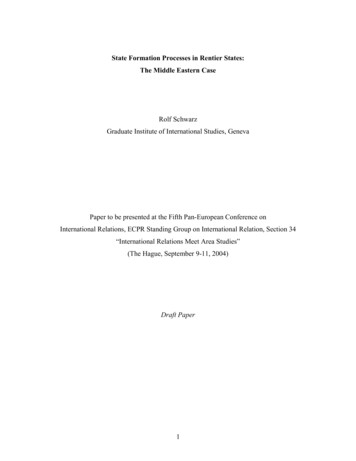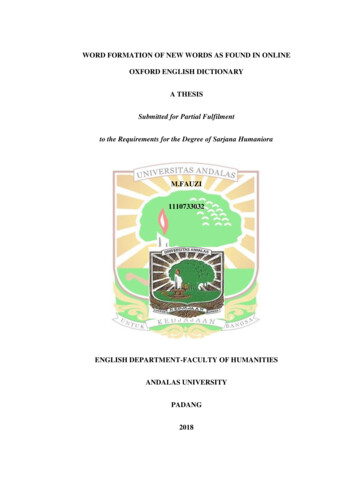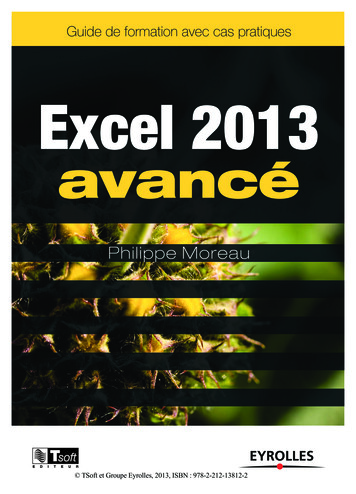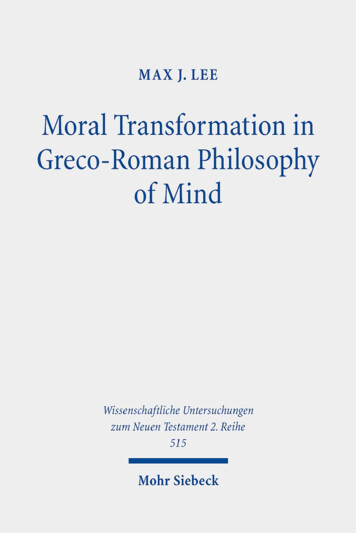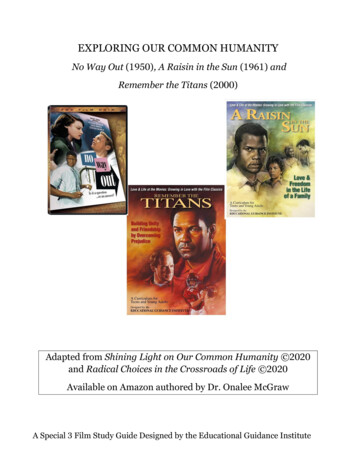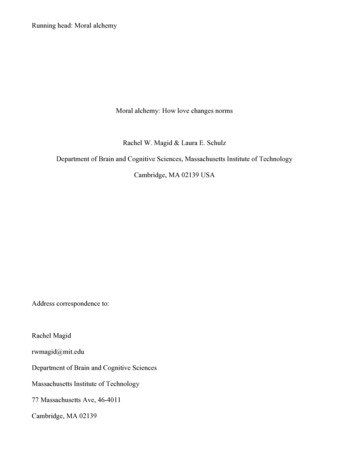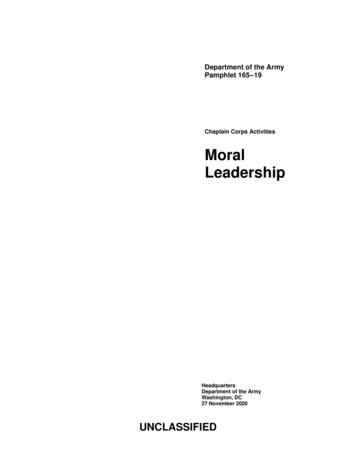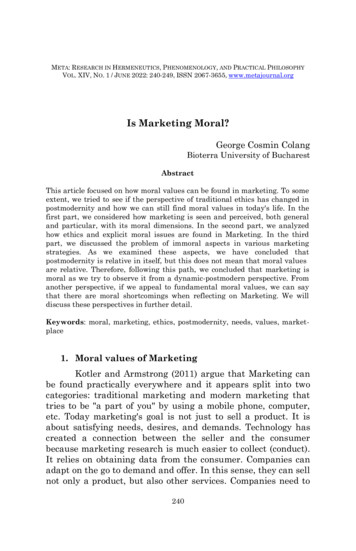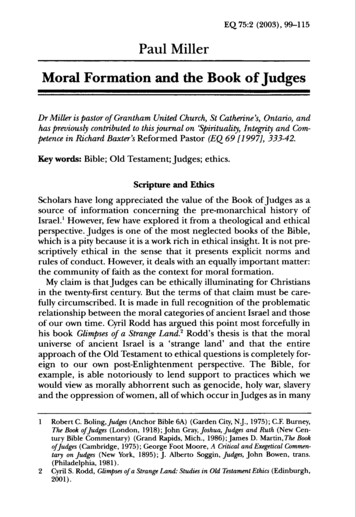
Transcription
EQ 75:2 (2003),99-115Paul MillerMoral Formation and the Book of JudgesDr Miller is pastor of Grantham United Church, St Catherine's, Ontario, andhas previously contributed to this journal on 'Spirituality, Integrity and Competence in Richard Baxter's Reformed Pastor (EQ 69 [1997J, 333-42.Key words: Bible; Old Testament; Judges; ethics.Scripture and EthicsScholars have long appreciated the value of the Book of Judges as asource of information concerning the pre-monarchical history ofIsrael.I However, few have explored it from a theological and ethicalperspective. Judges is one of the most neglected books of the Bible,which is a pity because it is a work rich in ethical insight. It is not prescriptively ethical in the sense that it presents explicit norms andrules of conduct. However, it deals with an equally important matter:the community of faith as the context for moral formation.My claim is that Judges can be ethically illuminating for Christiansin the twenty-first century. But the terms of that claim must be carefully circumscribed. It is made in full recognition of the problematicrelationship between the moral categories of ancient Israel and thoseof our own time. Cyril Rodd has argued this point most forcefully inhis book Glimpses of a Strange Land. 2 Rodd's thesis is that the moraluniverse of ancient Israel is a 'strange land' and that the entireapproach of the Old Testament to ethical questions is completely foreign to our own post-Enlightenment perspective. The Bible, forexample, is able notoriously to lend support to practices which wewould view as morally abhorrent such as genocide, holy war, slaveryand the oppression of women , all of which occur in Judges as in many2Robert C. Boling,Jud8l's (Anchor Bible 6A) (Garden City, NJ., 1975); C.F. Burney,The Book ofJud8l's (London, 1918); John Gray, Joshua, Jud8l's and Ruth (New Century Bible Commentary) (Grand Rapids, Mich., 1986); James D. Martin, The BookofJudges (Cambridge, 1975); George Foot Moore, A Critical and Exegetical Commentary on Judgl'S (New York, 1895); J. Alberto Soggin, Jud8l's, John Bowen, trans.(Philadelphia, 1981).Cyril S. Rodd, Glimpses of a Stran8l' Land: Studies in Old Testament Ethics (Edinburgh,2001).
100The Evangelical QJtarterlyother books. The best we can hope for, Rodd argues, is to catch'glimpses' of what ancient Israel meant by right and wrong and 'theOld Testament can only provide help with modern ethical problemsif its strangeness is taken fully into account.'3Rodd is certainly correct and his work is a strong challenge to thosewho would read the Old Testament anachronistically as if the mentaland moral framework of ancient Israel were the same as our own. Butthe question posed in this paper is not one strictly of history ('Whatdid the inhabitants of ancient Israel mean by morality?') but one ofbiblical hermeneutics and ethical reflection on Scripture ('How canthe biblical narrative be read and assimilated in our time?') Granted,these questions are not unrelated. Contemporary judgments must berooted in history. However, the community of faith is required tohear the text not merely as an historical artefact, but as a living story,containing within itself traditions of interpretation and transmittedto us via various interpretative traditions. Hearing the text as theWord of God within the community of faith is an activity of a different order from analyzing it as an historical source. As James Sanderspoints out, the text must be read theologically.4 This involves askingwhat the text can reasonably tell us of God and God's ways, not laboring under the illusion that there is a direct unmediated line of connection between the moral world of 1000 BC and today. This shouldcome as no surprise, however, because the same process is involvedin an informed reading of any text from long ago. We do not need,for example, to pretend that there are not profound differencesbetween our world and that of Elizabethan England to read Shakespeare with profit. The original context of the text guides but doesnot exhaust its meaning.And so we turn to the intriguing and enigmatic text of Judges togive us what it can reasonably give us, not so much specific ethicalnorms as a deeper awareness of the fundamentally communal character of Scripture. The biblical canon is reflective, in a primary sense,of a community's encounter with God in history. However, Scriptureis also constitutive of that community and regulative of its ongoingidentity. George Lindbeck talks of the 'grammar of religion.' A religion is a living faith analogous to a language that not only expressesideas and beliefs held by its adherents, but furnishes the rules bywhich such a community of belief is defined. 5 Communities of faith345Ibid,3oo.James Sanders, 'Hermeneutics,' The Interpreter's Dictionary of the Bible, Supplementary Volume (Nashville, Tennessee, 1976), 404.See G. Lindbeck, The Nature of Doctrine: Religion and Theology in a Post-Liberal Agl'(Philadelphia, 1984).
Moral Formation and the &ok ofJudges101shaped the biblical canon; but they continue to be shaped by it as well.The Bible is Holy Scripture and not simply a collection of interestingtexts because it is able to '[transmit] and [order] authoritative tradition . for a generation which had not participated in the originalevents of revelation.'6 A scriptural hermeneutic presupposes thepower of the texts to transmit a living tradition. Without such ahermeneutic, the Bible will tend to be approached only as a repository of historical data yielding inert knowledge of the past and placedunder the authority of some prior interpretive commitment, such ashistoricist, Marxist or feminist ideology. Scripture is Scripturebecause it has the authoritative weight of revelation within the community out of which it has emerged. It is in this communal sense thatScripture informs the church's ethical task.'However, to ground ethics in Scripture does not make right livingeasy or straightforward because the Bible is not merely a book ofrules. People of faith are still troubled by moral decision-making. AsJames Gustafson points out, ethical issues arise precisely because theanswer to the que'stion 'What ought I to do?' is not always obvious. sThis ambiguity is especially pronounced in the twentieth century.Dietrich Bonhoeffer addressed the devilish character of decisionmaking in 1943. In the surreal context of the Third Reich, Bonhoeffer questioned how it is possible to decide and to act with integritywhen none of the accepted ways of measuring right from wrong holdany long. Bonhoeffer wondered 'whether there have ever before inhuman history been people with so little ground under their feet people to whom every available alternative seemed equally intolerable, repugnant and futile .The great masquerade of evil has playedhavoc with all our ethical concepts. '9 Reason, conscience, duty, freedom - all the tried and true foundations of practical morality hadbecome utterly weightless and insubstantial in the crisis of totalitarianism. lo In our own situation, rife with apparently insoluble moral6Brevard S. Childs, Introduction to the Old Testament as Scripture (Philadelphia, 1979),60.7 Bruce C. Birch and Larry L. Rasmussen, Bible and Ethics in the Christian Life (Minneapolis, 1976), 127ff,8 James M. Gustafson, Ethicsfrom a Theocenmc Perspective (Chicago, 1981) 1:87.9 Dietrich Bonhoeffer, Letters and Papers from Prison, enlarged edition (New York,1971),3-4.10 The philosopher Hannah Arendt argued that totalitarianism reduces the humanperson to a never hanging identity of reactions, so that each of these bundles ofreactions can be exchanged at random for any other.' The concept of the personas a free moral agent is obliterated. Human beings become purely reactive creatures and ethics comes to an end. Totalitariansim (Part Three of The Origins ofTotalitarianism [San Diego, New York, 1968]), 135.
102The Evangelical Q;larterlydilemmas, we might well ask with Bonhoeffer, 'Who stands fast?'lIStanley Hauerwas has argued that, even though every age has beentormented by moral choice, ethics is especially vexing in our timebecause we have lost precisely this sense that it is a communal enterprise. 12 Kant and his successors sought to define ethics strictly interms of decisions made by autonomous moral agents. But Christianethics has never been individualistic. Ethics is more a process of formation, as Bonhoeffer himself understood,13 and Christian formation takes place primarily within the community. Over the last twentyfive years, several Christian ethicists such as James Gustafson, JamesMcClendon and Stanley Hauerwas have attempted to reassert theproper communal basis for ethics. Ethics involves more than simplyjudging between alternatives, what one writer has described as'quandary ethics'.14 Moral living consists of more than episodes ofdecision. It is the cultivation of practices and virtues that can only beformed within the context of a coherent life story.15 An ethical visionmore faithful to Scripture and Christian tradition attempts todevelop an 'ethics of character' in which internalized values andqualities become the precondition for making responsible choices.Ethics becomes more a matter of who one is than what one does.While it includes the act of choosing between alternatives, it is notconfined to those acts of decision. 16Judges as ScriptureTurning to the Book of Judges, whatever else it may be (historicalsource, monarchist propaganda), for Christians today it is Scripture.As such, it has both a community-forming and community-regulatingfunction. It narrates the history of Israel prior to the institution ofthe monarchy in such a way that the significance of those events isnot exhausted by changes in historical circumstance but continues toshape those who read it with the eyes of faith. Its meaning for todayis not defined primarily by the methods of historical criticism11 Letters and Papers, 4.12 The Peaceable Kingdom: A Primer in Christian Ethics (Notre Dame, Indiana, 1983).13 See 'Ethics as Formation' in Ethics, Eberhard Bethge, ed., (New York, 1955),64119.14 Edmond Pincoffs, quoted in James Wm. McClendon,Jr., Biography as Theology: HowLife Stories can Remake Today's Theology (Nashville,Tennessee,1974),19ff.15 James Wm. McClendon,Jr., Systematic Theology: Ethics (Nashville, 1986),171.16 See McClendon, 'In Search of an Ethics of Character' in Biography as Theology,pp. 13-38; James M. Gustafson, Christian Ethics and the Community (Philadelphia,1971) ; Stanley Hauerwas, Character and the Christian Life: A Study in Theological Ethics(San Antonio, Texas, 1975); William H. Willimon, The Service of God: Christian Workand Worship (Nashville, 1983).
Mural Formation and the Book ofJudges103(although these perform a useful function) but by a careful andprayerfullistening to the voice of God in and through the texts.The main ethical thrust ofJudges could be summarized as follows:The very capacity to make moral judgments itself arises from thedesire to obey God. The community of faith is the context in whichthis capacity of obedience is learned and practiced. Conversely, whenthe covenant relationship between God and God's people is neglected, the faculty of moral judgment atrophies. It not only becomesimpossible to do right, it becomes impossible to know what is right.Judgment is not a function of autonomous practical reason but of aliving relationship with God.Judges may be read as Torah in narrative form - halakah (law) ashaggadah (story). An appreciation of this dimension of Judgesrequires a literary as well as a historical-critical reading. The maindevice propelling the narrative is irony. This is the thesis of LillianKlein in her study The Triumph of Irony in the Book ofJudges. 17 Kleindeparts from the standard critical view thatJudges is a clumsily editedmishmash of conflicting sources. IS She interprets the book as a collection of disparate narratives skilfully integrated into a structuredwhole by the use of irony. I will draw significantly on Klein's treatment in what follows.The 'art of irony is the art of saying something without really sayingit. 19 Recognizing the presence of irony makes for a much more interesting reading of Judges. It cannot be fully understood if it is alwaysread simply at face value. For example, the formulaic statement 'inthose days Israel had no king' is often taken to be a polemical slogansupporting Israel's desire for a monarchy. The narrative shows, however, that the author/redactor intended this ironically. Of courseIsrael had a King. His name was Yahweh and their predicament wasa consequence of their ignoring of this fact. Reinhold Niebuhr haspointed out that 'irony involves comic absurdities which cease to bealtogether absurd when fully understood. '20 This is certainly true ofJudges which tells a tragicomic tale of a people's descent into moralconfusion and their growing impotence to do anything about itbecause they walked in their own way rather than in God's.An Ironic Interpretation of Israel's HistoryJudges opens with a foreshadowing of a dominant theme of the17181920LilIian R Kiein, The Triumph of Irony in the Book ofJudges (Sheffield, 1988).See, for instance, Gray, Joshua, Judges and Ruth, 348.D. C. Muecke, The Compass of Irony (London, 1969),5.The Irony of American History (New York, 1952),2.
104The Evangelical QJtarterlyDeuteronomic history: Israel's dangerous coexistence with Canaanite peoples and their gods. 21 The Canaanites, aside from their historical significance, have a kind of symbolic or mythic status in theHebrew Bible. They represent the ever-present temptations of syncretism and idolatry. The Canaanite way is portrayed as a 'formulafor death', physically, militarily, socially, but above all, spiritually.22Chapter 1 contrasts the ignominious fate of the idolatrous boasterAdoni-Bezek at the hands of the mighty men ofJudah (1:7) with theblessedness of Othniel and Achsah. These two are the ideal types offaithful Israel, the courageous warrior and the confident and fruitfulbride (1:13-15) .23 Othniel and Achsah dwell in obedient shalom, perpetuating the tradition of Caleb.But chapter 1 also introduces the ominous counter-example of theCanaanites. They bring military oppression (1:19) but, even worse,spiritual and moral compromise. The Canaanites possessed technologically superior weaponry, but more dangerous was that fact thatthey were a potential 'snare' to Israel (2:3). The theme of Judges isthe progressive backsliding of God's people into the death-dealinghabits of their neighbors who in turn became a source of torment toIsrael. The book repeats a dreary refrain: The Israelites did what wasevil in the sight of Yahweh; God punished them by sending a tyrantto rule over them; they cried out for relief; God heard their cries and,in the absence of a central ruler, raised up charismatic leaders calledjudges to deliver them. The judges brought peace; but as surely as thesun rises the cycle of apostasy began again. Judges portrays this cyclenot as the mere eternal recurrence of the same but as an actualdownward spiral. Repentance never restored their relationship withGod to its original integrity. The effect of their willful alienation fromGod was cumulative. Each successive period of decline turned out tobe more disastrous than the one before until Israel reached the levelof total moral anarchy and became no better than the Canaanitesthey were sent to conquer.Klein suggests that Othniel was not only the first of the judges but21 I use the term 'Deuteronomic history' simply to assent to the generally acceptedtheory that the Hebrew Bible from the Book of Deuteronomy to Second Kingsshows signs of being the work of a single redactor or school of redactors; and thatit expresses a unitary theological vision. Detailed critical issues such as whetherchapters 20 and 21 actually originated with 'the Deuteronomist' or come from aseparate tradition are outside the scope of this essay or the author's competence.(See Robert C. Boling,Judges [Anchor Bible 6A. Garden City. NJ., 1975], 278).22 E. John Hamlin, Judges: At lUsk in the Promised Land (International TheologicalCommentary) (Grand Rapids, 1990), 15.23 Klein, 27.24 Ibid., 34.
MoralFurmation and the &ok o/Judges105the ideal judge (3:7 11).24 He was the nephew ofCaleb and carriedon the 'different spirit' of faithfulness exemplified by his uncle(Numbers 14:24). Two factors marked Othniel's leadership. He wasfilled with the Spirit of the Lord (3:10); and he made war successfullyagainst the Arameans (3: 11). These two characteristics were not coincidental. Battles are won when they are fought in response to God'scommand. Subsequent leaders departed further and further fromthe example. Some possessed the Spirit but did not take up God'scause (Samson). Some acted decisively but did so without the authority of the Spirit (Ehud). Every judge after Othniel represented a corruption of the ideal.The judge Ehud, for example, appears to be a strong deliverer. Heuses treachery to murder the Moabite king Eglon (3:15ff.). However,God's Spirit is conspicuously absent from Ehud's actions. He actsboldly but autonomously, foreshadowing the verdict of theauthor/redactor of Judges that everyone in Israel did as he or shesaw fit.The reign of Deborah confirms Yahweh's predilection for choosingunusual leaders, not only a woman but also a younger son (Othniel)or a left-handed warrior (Ehud). Deborah was a prophetess in whomthe Spirit of God was alive and active (4:4ff.). However, an ominoussub-theme in the Deborah narrative is provided by Jael, the wife ofHeber the Kenite, who boldly kills Sisera, but, like Ehud, actsautonomously without Yahweh's instigation. 25 Laudable as heractions might appear,Jael adds to the growing list of those who takematters into their own hands.Gideon is a major player in the draIl1a of Judges. He possesses allthe marks of a truly gifted leader. He is the recipient of divine grace,being from the least important clan of Manasseh, yet elected todeliver Israel (4: 15). Like Moses, Gideon is privileged to hear anunmediated word from Yahweh (4:14). Unlike Moses, however,Gideon puts God to the test by demanding a tangible sign of God'sreliability not once but twice (6:3MO). Midian's defeat is orchestrated by Yahweh deliberately 'in order that Israel may not boastagainst me that her own strength has saved her' (7:2 NIV). Yet boasting is precisely what Gideon does. 'For the Lord and for Gideon' hecommands his men to shout when they attack (7:19).26 This hubris,subtly inserted into the narrative, comes to dominate the plot ofJudges. Gideon, the conqueror of tyrants, shows himself to be a tyrantin his treatment of the town of Succoth (8:5-17). His egocentricity25 Ibid., 41-42.26 Ibid., 57, 59.
106The Evangelical Q!tarterlyimpairs his sense ofjudgment. Even the great Gideon is guilty ofplacing his own ambition ahead of the humble worship ofYahweh.For all his self-centredness, Gideon is wise enough to decline theinvitation to become Israel's king. 'Yahweh will rule over you', he says(8:23). But immediately, Gideon empties his own words of credibilityby fashioning a golden ephod as a personal object of worship. Thismay have seemed like an innocuous enough transgression at the timebut, we are told, the ephod became 'a snare' to both Gideon and hisfamily (8:27).These episodes of relatively minor negligence set the stage for oneof the truly grotesque events in Judges. Abimelech was Gideon's sonby his Shechemite concubine (8:31). Egotism and idolatry were asubtext in the Gideon narrative but they erupt with full force in thetale of Abimelech. Abimelech's first notable act is his personal murdering of 70 of his brothers. The author/redactor clearly intends thisatrocity to be seen as human sacrifice which may have been typical ofthe Canaanites, but was utterly abominable to Israel (9:5).27 He convinces the Shechemites to crown him king and inaugurates a reign ofgratuitous violence in which king and subjects begin to devour oneanother. The Abimelech narrative contradicts the thesis that Judgesis primarily a monarchist tract because, as chapter 9 makes clear, themere fact of having a king is no guarantee that righteousness willreign. Kings can turn out to behave like Abimelech.Justice and peacearise from faithfulness to Yahweh, not from political organization.After Abimelech's antics, Yahweh's patience wears thin. When thePhilistines and the Ammonites attack, God resists the people's pleafor help. 'Go and cry out to the gods you have chosen', the Lord says.'Let them save you when you are in trouble' (10:14). However, God'smercy proves stronger than the people's sin or his own anger. Yahwehrelents once more and along comes Jephthah, another deliverer whois long on enthusiasm but short on judgment. Jephthah's character ismarked by impulsiveness and lack of prudence. These tragic flawsproduce the most poignant tale in the book. Jephthah makes a rashvow that he will sacrifice whatever emerges from his house first if theLord helps him to defeat the Ammonites (11: 30-31). God grants himsuccess, but shows that one ought to think before speaking. Out ofthe house comes Jephthah's only daughter, singing and dancing.Jephthah follows through with his promise, regarding his ill-conceived word as of more value than the life of his daughter. Jephthah'soffering verges on the abhorrent practice of human sacrifice. Hismoral compass is so skewed that he truly believes that Yahweh would27 Hamlin identifies human sacrifice as one of the markers of 'the Canaanite way ofdeath' (Judges, 15);
Moral Formation and the Book offudges107prefer he keep a foolish oath even at the cost of an innocent girl'slife. Jephthah graphically demonstrates his estrangement from thetrue Spirit of God.The same is true of the last and most famous judge, Samson. Samson, although a Nazirite, touches and eats that which is unclean(13:4; 15:15).28 Even worse, Samson has a fatal weakness for foreignwomen. He is a strong man who is the weakest judge of all becausehe cannot master his own passions. 29 He plays the part of championof Israel and scourge of the uncircumcised, but his egocentricity andlust make him more like the Philistines than unlike them. Samsonfalls prey to his own nature and dies alongside the pagans he set outto destroy.Israel in Moral Free-FallFollowing Samson is the section ofJudges often referred to as an 'epilogue' suggesting that it stands apart from the main narrative, almostas an afterthought. 30 In fact, though, chapters 17 to 21 are the climaxof the theme which gives Judges its dramatic and theological unity:that those who break communion with Yahweh lose the ability to tellright from wrong. These chapters describe the final descent intomoral anarchy. One commentator entitles these chapters 'The YearsofLawlessness.'3! Structurally, this section is framed by the refrain 'Inthose days Israel had no king; everyone did as he saw fit' (17:6; 21 :25;also 19: 1). It is a misreading of the intention of the book to interpretthis in narrowly political terms. The refrain is, again, deeply ironic.Lawlessness has little to do with the lack of a strong centralized political and military administration and everything to do with spiritualmalaise. 32 The irony is, of course, that Israel did have a king. Thatking's name was Yahweh. Over time, by the habitual neglect of thecovenant relationship with the living God, Israel lost its redemptivememory of the one under whose sovereignty they existed. I wouldcontend that Judges is a tale of progressively more acute spiritual vertigo. By this point in the narrative, not only did Israel not do what wasright, they could not do what was right. Their own apostasy created amoral and spiritual paralysis. They no longer even had the means ofdiscerning the will of God. They wandered aimless and lost.28 Klein, 129.29 Ibid.,118.30 In fact, this supposed 'afterthought' makes up almost one quarter of the book andis by far the longest continuous narrative in Judges.31 Martin, The Book ofJudges, 181.32 I say this in disagreement with Martin: 'the absence of a central monarchical system is used to explain the generally anarchic state ofthe country' (199).
108The Evangelical Q}tarterlyChapters 17 to 21 consist of a triptych of apparently disparate butthematically related episodes. Chapter 17 tells of an Ephraimitenamed Micah who steals 1100 shekels of silver from his mother. Heowns up to his theft and, surprisingly, she blesses him, thereby givingtacit approval to what he has done. Micah uses the stolen money topurchase a carved image. He then hires a peripatetic Levite to be hispersonal priest, and ascribes all his good fortune to Yahweh (17:13).These seem like victimless crimes. But Micah has violated the eighthcommandment (stealing), the third (trivializing God's name) andmost especially the first and second (making a carved image andbowing down in worship to it). The underlying theme of Judges isthat sin is cumulative and communal in its effects. Small sins createthe climate in which great ones can flourish; and individual actionshave far-reaching effects. Micah's apparently small transgressions setthe stage narratively for much more deadly sins.In chapter 18, the scene shifts to the tribe of Dan. 3:trhe Daniteshad no·territory of their own. Theirs had been allotted in the western hills and coastal plain; but the hostility of enemies preventedthem from taking possession of what was theirs.34 Their ongoing landlessness, however, is more than just a value-neutral statement of fact.The Deuteronomic perspective is that land is a sign ofYahweh's favor.Israel will possess and thrive in the land if they cleave to theircovenant with their God. 35 A tribe perennially deprived of its share ofthe land must be in a state of disharmony with God's will.What the Danites cannot acquire by grace they seize by forcethrough an act of conquest that is the exact antithesis of the holy warsofJoshua and Judges 1. In a parody of Numbers 13, the Danites sendout spies to scout the countryside (18:2). The spies sent by Mosesinto Canaan returned with tales of a bountiful land but terrifyingenemies (Numbers 13:27-29). Conquest of that land demanded theutmost courage and trust in God. The Israelites suffered a failure ofnerve and their cowardice resulted in forty years of wandering inthewilderness. By contrast, the Danite spies happened on the town ofLaish and returned with a report of a peaceful and unsuspecting people (18:7). Their cowardice topped that of their ancestors in thewilderness. They set upon Laish and butchered its innocent inhabitants, razing it to the ground, with no motive other than greed.Making war was always the prerogative of Yahweh. Conquests were33 The instability of location in Judges, shifting without apparent reason from oneplace to another, in itself reinforces the point that moral sickness had attacked thelength and breadth of the land.34 Joshua 19:37;Judges 1:34.35 See, e.g. Deuteronomy 5:33.
MoralFormation and the BooIc ofJudges109'devoted' to Yahweh which meant that they were destroyed utterly,not out of blood lust, but so that people would not be tempted to usethe plunder for personal gain (cf. 1 Samuel 15). Victory was to theglory of God, not to the enrichment ofIsrael. The Danites' barbarismbears a superficial resemblance to the conquest of Canaan but with acrucial difference: it was undertaken on their own initiative, neitherguided nor blessed by God. It is hardly surprising that, when the Danites rebuilt Laish, they made it a place of idols (18:30-31).The third scene in the triptych concerns another homeless Levite,a free-lancer unattached to the official levitical cities, who 'camefrom nowhere in time and in space.'36 This man is the metaphoricalembodiment of Israel who have become alienated from the identitygiving narrative in which the capacity for right living is nourished.This episode is thick with irony. The Levite pursues his promiscuousconcubine to her father's house. He and the father-in-law spendthree days drinking and dining together (19:4). Against his betterjudgment, the Levite allows his father-in-law to detain him until closeto nightfall on the day when he must set out for home. It is an apparently innocent indiscretion with serious consequences.This rootless wanderer, however, has no powers of judgment. Living in estrangement from God, he is incapable of doing the rightthing or of intuiting the impact his actions. Arriving at the town ofGibeah, the Levite and his concubine are taken in by an elderly man(19:16-21). As chapter 18 paralleled Numbers 13, so this narrativemirrors the story of Sodom in Genesis 19, but again, with several significant differences. As with Lot's guests, the men of the town surround the house, demanding that the Levite be sent out so they canrape him (cf. Genesis 19:5). The owner, unwilling to violate the lawsof hospitality offers them first his own virgin daughter and then theLevite's concubine (cf. Genesis 19:8). Gibeah, like Sodom, is a placeso far sunk in unbelief that the faculty of moral judgment has all butdisintegrated.Genesis 19 is sometimes interpreted as if it were somehow legimitating Lot's offer of his daughters in exchange for the guest. Misogyny, the argument runs, is so ingrained in the culture of the Biblethat the rape of young women is regarded as more acceptable thanthe rape of men, or even the violation of hospitality.37 While plausible36 Klein, 161.37 See Phyllis Trible, Texts of Terror: LiteraryFeminist Readings of Biblical Narrative(Philadelphia, 1984), 68ff. Also Koala Jones-Warsaw, 'Towards a WomanistHermeneutic: A Reading ofJudges 19-21' in Athalya Brenner, ed., A Feminist Companion to Judges (Sheffield, 1993) 172-186 for an interpretation according to thecategory of victimization.
110The Evangelical Quarterlyon one level, it seems to me that this reading misses the profoundpo
Mural Formation and the Book of Judges 103 (although these perform a useful function) but by a careful and prayerfullistening to the voice of God in and through the texts. The main ethical thrust of Judges could be summarized as follows: The very capacity to make moral judgments itself arises from the desire to obey God.


